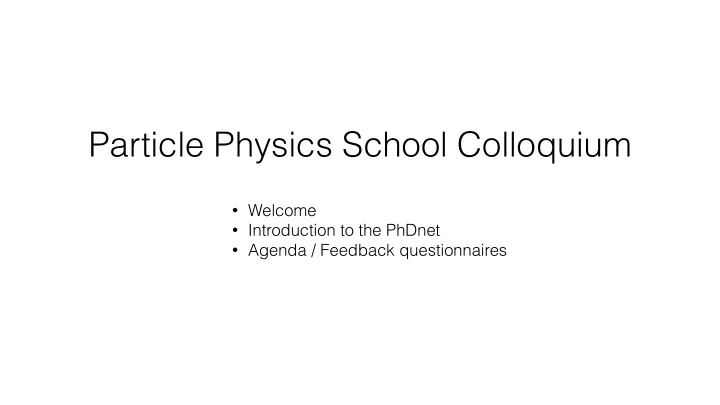

Particle Physics School Colloquium • Welcome • Introduction to the PhDnet • Agenda / Feedback questionnaires
Preliminary 2018 agenda
Max Planck PhDnet
What is this about? • There is a thing called the PhDnet, we are all part of it • I want to show what it is, how it works, and who is active. • There is an annual meeting (this year: 8 – 10 Nov) • I want to show parts of the introduction • There was large survey last year (2218 participants) • I want to show some of the results • The full sets of slides are on Indico if you want to know more
PhDnet Annual Report Leonard Borchert 2017 PhDnet Spokesperson
The Max Planck Society 83 institutes in Germany (and the Netherlands, Italy, and the USA) with ~9,000 researchers and ~4,500 doctoral researchers in 60 Grad Schools at 80 institutes Focus on basic research „Insight must precede application “ 3 Sections: Biology and Medicine (BMS) Chemistry, Physics and Technology (CPTS) Humanities (HUM)
Max Planck PhDnet - Structure Founded 2003 Regional Hubs Work Groups Representatives at local institutes Steering Group
Regional Hubs Hanse Hub Berlin-Potsdam Hub Köln-Bonn Hub Dresden Göttingen Hub Hub Leipzig-Halle Hub Frankfurt Area Hub Munich Hub Tübingen-Stuttgart Hub
Agenda 2017 1.) Build and expand networks - Strengthening PhDnet - N ² , the Network of Doctoral Researcher Networks 2.) Equal opportunities & healthy work practices - BGM working group - Diversity management 3.) Career opportunities - facilitate transitions between academia & „ the outside world “ - career fair & workshops 4.) Compensation & contracts - full pay and full vacation for full work - 2017 PhDnet Survey
1.2 Networks - External www.phdnet.mpg.de/N2
3. Career Opportunities Successful 3 rd PhDnet Career Fair at Harnack Haus Before Visions in Science Conference 13 organizations, Alumni Talks 200+ attendees THANKS TO GABE!
4. Compensation & Contracts Meeting with the President and General Secretary -> 30 vacation days failed at GWK -> BUT generally very open to it -> Complete switch to TVöD currently not likely; with increased vacation not necessary? 2017 PhDnet Survey as evidence Career Service Report
New Website www.phdnet.mpg.de https://www.facebook.com/maxplanckphdnet
PhDnet Survey 2017 Previewing the Report 16 th PhD General Meeting 08.11.17 Survey Working Group – Miguel Borges
Overview 1. Demographics 2. Working conditions 3. Career perspectives 4. Equal Opportunities 5. Funding 6. Networks
1. Demographics – Gender identity
2. Working conditions – Supervision satisfaction
2. Working conditions – Working hours ➢ Working hours o 47 on average o With children o As the project advances in years
3. Careers – Hopes and plans
3. Careers – Academia
4. Equal Opportunities – Stress and mental health ➢ Mental health diagnosis o About 6% report having been diagnosed with a mental health issue (4.7% + 1.3% who only said so in comments)
5. Funding – Contracts and stipends
5. Funding – Contracts and stipends
5. Funding – Holidays
<end of the karaoke> Check out Indico for more charts!
Particle Physics School Colloquium Thursday, 14 December 2017 from 10:00 to 18:00 (Europe/Berlin) at Main Auditorium, MPP, Foehringer Ring 6, Munich Manage Thursday, 14 December 2017 10:00 - 10:30 Welcome coffee and get together 10:30 - 10:45 Introduction 15' Sprecher: Andreas Hönle 10:45 - 11:15 Hidden symmetries in integrable models 30' Sprecher: David Osten 11:15 - 11:45 Topological Superconductors 30' Sprecher: Ismail Ahmed 11:45 - 12:15 Gravitational memory 30' Sprecher: Henk Bart 12:15 - 12:45 Feedback in small groups 12:45 - 13:45 Lunch break 13:45 - 14:15 Coffee 14:15 - 15:30 Guest Lecture: Distinguishing axions from WIMPs as CDM? 1h15' The QCD Axion is a Beyond-the-standard-model Curiosity: introduced to solve the strong CP problem, it is effectively described by a one-particle, one-parameter new physics model, and it contributes Dark Matter which redshifts and grows linear structure like CDM, despite having a mass comparable to a neutrino's. In the scenario where the axion is born after inflation, I will review the growth of Large Scale Structure in the presence of axion CDM, and speculate about axion configurations in our galaxy today. Sprecher: Prof. Sacha Davidson 15:30 - 16:00 Coffee 16:00 - 16:30 Background measurements with electric dipole pulse at the KATRIN experiment 30' Sprecher: Anna Pollithy 16:30 - 17:00 New light detector prototyping for the MAGIC telescopes 30' Sprecher: Alexander Hahn 17:00 - 17:30 Probing Gamma-ray Emission of Geminga and Vela with superposition model 30' Sprecher: Yating Chai 17:30 - 18:00 Feedback in small groups
Recommend
More recommend